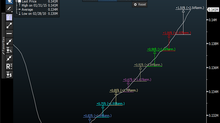Buy the Eggs, Sell the Sugar
One of the more frustrating things about the battle against inflation is that there are things that are beyond our ability to control, and a restrictive monetary policy is no way to fix them. As mentioned before, CPI and CPI-U, which includes food and energy, is a weighted basket of commodities meant to mirror the purchasing habits of an "average" American family, which to my mind, is impossible to properly gauge. We all experience inflation differently.
For example, if I've been living in a home with a fixed rate mortgage, and work from home, inflation isn't as noticeable for someone who rents their residence and drives to work. Looking at the array of individual food categories tallied up in CPI-U, even your diet and eating habits can affect how much the needle moves on your daily expenses. And again, there is the "weighting" issue.
So, expressions like "your income has declined by 7.8% (or what ever the headline inflation rate is) doesn't quite ring true. As they say, your mileage may vary.
But two rapid price swings in basic foodstuffs caught my eye recently. Remember all the crying over egg prices? Well, that was caused by a bout of avian flu, which happens from time to time, and will no doubt happen again. That sent egg prices soaring, sometimes even tripling from normal prices paid, depending on where you lived. Lots of screaming and media coverage on that one.
Well, that crisis has finally passed. Millions of chickens were slaughtered to contain the spread of the disease, but their efforts have succeeded, and production and supply has normalized. So too, have prices.
But we have another mini-crisis on our hands in the price of sugar. Weather extremes in areas where the product is heavily produced, made for poor harvests of cane, and prices have reacted accordingly. So while one commodity price plummets, another takes off. (Sugar: BLUE line, Eggs: RED line)

Never realized what a volatile commodity sugar was until I looked into this!
Which brings us to another issue, that Mark Dow of Behavioral Macro has brought up: the "hyper financialization" of commodities markets. It's something we have to live with, but today's markets are perhaps more prone to price volatility than ever before. I noted this when the price of diesel fuel spiked sharply last year from $3.613 a gallon on January 1, 2002 to $5.25 by March 14th.

From a pure supply standpoint, there shouldn't have been that much of a spike in so short at time. Note particularly the dogleg spike on February 28 to the first peak of March 14th. That's a $1.15 a gallon increase in just two week's time. Brutal, especially if you happen to run a fleet of delivery trucks,
But, it's the traders who set the price based on expectations. Throughout the time of the price spike, there were no shortages of product, no gas lines, nothing to indicate that much stress on supply.
It's something we have to live with, but the hyper financialization of commodities will move CPI data up OR down more than we expect. For this round, perhaps a cut back in chocolate consumption is in order.
September 11, 2023













